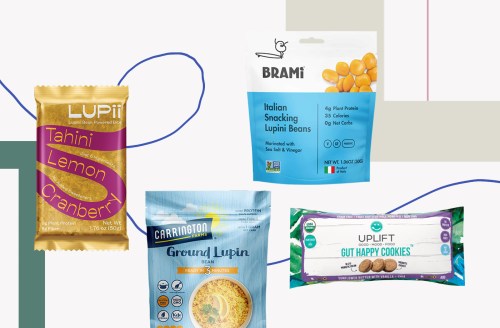We’re calling it: Lupini beans are the gut-healthy superfood of 2020
Everything you need to know about lupini beans, including the health benefits and new food products making them widely available.

As a kid with Italian roots, Aaron Gatti and his family used to visit his grandmother in Rome every summer, and he always looked forward to the food he’d eat there. Besides the abundance of fresh seafood and pasta, he loved snacking on these little beans called lupini that were widely available at the local markets and stores.
A common snack in the Mediterranean region, lupini beans (also called lupin beans) come from the same food family as chickpeas and lentils. They’re similar to fava beans in terms of size and shape, but taste a bit closer to soy beans. And they just happen to be a nutritional goldmine. Not only does a serving have double the protein as chickpeas, it has more fiber too (as well as more than in oats and quinoa).
Of course as a kid, Gatti was unaware of the benefits; all he knew was that they tasted good. But after introducing them to his wife as an adult, she convinced him to bring the superfood to the U.S., leading Gatti to launch Brami, a snack line of seasoned lupini beans.
His company isn’t the only one bringing the food to the U.S.; because of its many benefits, lupini beans are quickly becoming a trending ingredient in the wellness world. Chickpeas, better watch your throne…
A sustainable protein source
Like Gatti, lupini beans were a staple entrepreneur Isabelle Steichen grew up with in Europe. She too was surprised when she came to the States and didn’t see it anywhere. “It’s an ingredient that was born in the wrong country in a way, because Americans care very much about getting enough protein, and it’s such a great source,” she says. It’s why Steichen and her friend Alexandra Dempster teamed up to co-found Lupii ($40 for 12), a newly-launched line of protein bites with lupini beans as the starring ingredient.
“Not only are lupini beans more protein-rich than soy, they’re also an incredible sustainable food because they are used as a rotation crop,” Steichen says. Basically, sustainable farmers plant different crops on the same land throughout the year (a practice called crop rotation) to help battle erosion and increase soil fertility. Lupini beans have been found to be so successful in doing this that they were brought into Australia to help revitalize the nation’s wheat farms. Fifty years later, Australia is a leading supplier of the bean.
Dempster became excited about lupini beans because they not only taste good (a must for her, as a food entrepreneur), but also met the growing demand for plant-based protein. “We decided to introduce it to consumers as a bar because bars are something people are already familiar with, so that way, they’re learning about a new ingredient in a familiar food,” she says. (Other ingredients in the bar include familiar favorites too, such as peanut butter, almond butter, cinnamon, and dates.)
A potential solution for quinoa fatigue
Another way lupini beans are popping up is as a side dish from Carrington Farms. The brand’s newly- launched product, Ground Lupin Bean ($15), is just one ingredient, and is meant to be used similarly to quinoa or couscous. “The ground-up beans have mostly a neutral taste, so they really take on whatever spices you add,” Carrington Farms CEO David Eben says, adding that he often keeps his simple, adding just lemon juice and garlic. “This makes it very versatile and allows people to use it similarly to how they use rice or quinoa.” However, unlike rice or quinoa, lupini beans are so low-carb that they even get a keto stamp of approval. That’s something not even chickpeas or lentils can claim.
“We see lupini beans as a food that has the potential to change an entire category of food,” Eben says. In other words: Don’t expect this to be the one and only lupini product from the brand; the ways to use it are limitless.
The gut-healthy cherry on top
As if you needed another reason to try it, lupini beans are also good for your gut thanks to their high fiber content. “They’re such a fantastic, dense source of both protein and prebiotic soluble fiber with additional fibrous carbohydrates with little starch or sugars,” says registered dietitian and Uplift Food CEO Kara Landau, RD. The fiber is why she decided to make lupini beans the primary ingredient in the brand’s Gut Happy Cookies ($35 for 12-pack).
Want to know more about gut health? Here’s your 101 guide from an RD:
One in-vitro study found that lupini beans were linked to increasing the generation of short chain fatty acids in the gut while also increasing the population of good gut bacteria. “This impact on the intestinal microbiota suggests that lupini seeds may be used in the development of novel functional foods, which can be included in dietary strategies for human health promotion,” the findings read. Another study found that a diet rich in lupini beans—along with other legumes—is linked to lowering the risk for colon cancer and also reduced cholesterol levels.
“Lupini beans lend themselves very well to so many people’s dietary requirements who need to keep blood sugar levels balanced, feed the good gut bacteria, and feel full—all this without a particularly high calorie provision for those that are mindful of their energy intake,” Landau adds.
Clearly Americans have been sleeping on a protein source that is full of health benefits. (Leave it to the Mediterranean region and Australia to be ahead of us.) But this year, lupini beans are about to get the attention they deserve in the U.S.—and your pantry is going to be that much healthier because of it.
Here’s why plant-based eating is here to stay. Another place you’ll find an abundance of healthy choices: the frozen food aisle.










